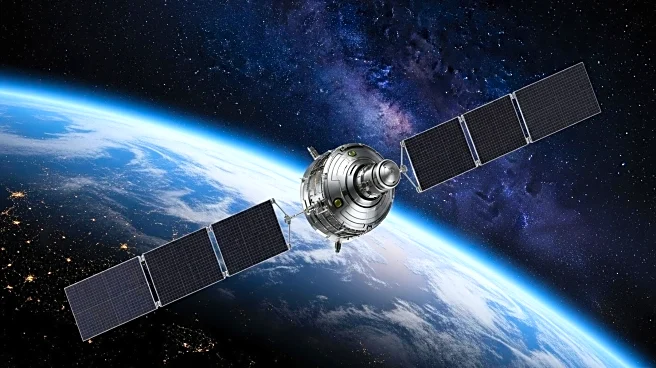What's Happening?
SpaceX is set to launch 24 satellites for Amazon's Project Kuiper from Cape Canaveral Space Force Station. The launch, scheduled for October 11, will be the third dedicated mission by SpaceX for Project Kuiper, which aims to establish a broadband megaconstellation in low Earth orbit. The network will eventually consist of approximately 3,200 satellites, with 129 already in orbit. The satellites will be deployed at an altitude of 289 miles, and the Falcon 9's first stage will land on a droneship in the Atlantic Ocean. This mission is part of a broader effort to compete with other megaconstellations, including SpaceX's Starlink and China's Guowang and Qianfan projects.
Why It's Important?
The expansion of Project Kuiper is significant for the satellite broadband industry, as it represents Amazon's entry into a competitive market dominated by SpaceX's Starlink. The deployment of these satellites will enhance global internet connectivity, particularly in underserved regions. The competition among companies like SpaceX, Amazon, and Chinese firms could drive innovation and lower costs, benefiting consumers worldwide. Additionally, the successful launch and deployment of these satellites will bolster SpaceX's reputation as a reliable launch provider, potentially attracting more commercial contracts.
What's Next?
Following the launch, Amazon will conduct initial health checks on the satellites and raise them to their operational altitude. The company plans to continue expanding the constellation with over 70 additional launches using various rockets. As the network grows, Amazon will likely focus on establishing partnerships and securing customers for its broadband services. The competitive landscape may lead to further advancements in satellite technology and increased pressure on regulatory bodies to manage orbital traffic and spectrum allocation.
Beyond the Headlines
The development of satellite broadband networks raises questions about space debris and the sustainability of low Earth orbit. As more companies launch large constellations, the risk of collisions and the creation of space debris increases. This necessitates international cooperation and regulation to ensure safe and sustainable use of space. Additionally, the expansion of satellite internet services could have cultural and economic impacts, bridging the digital divide and enabling new opportunities for remote communities.










